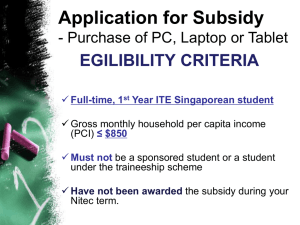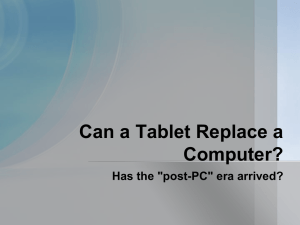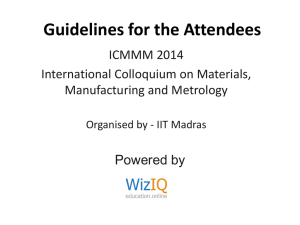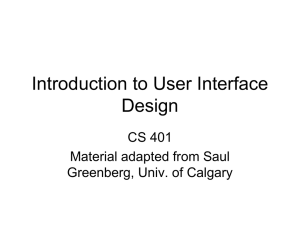INVESTIGATING STUDENTS* ACCEPTANCE OF TABLET PC IN
advertisement
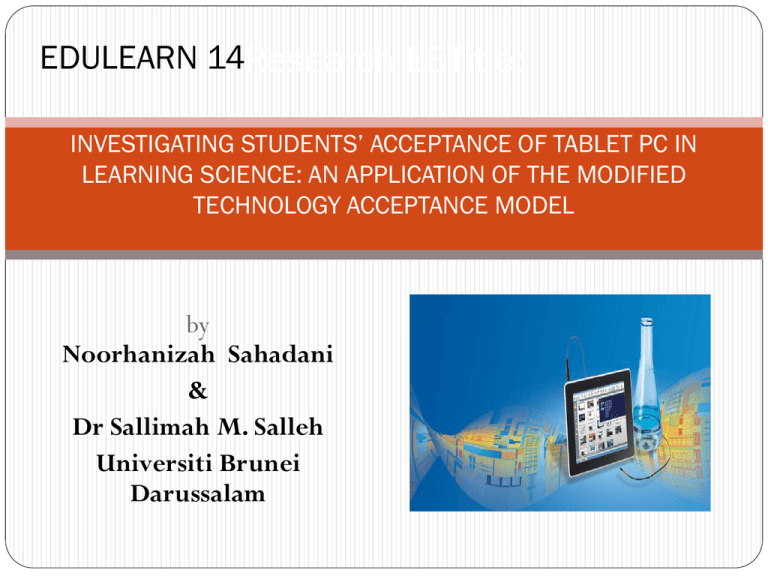
EDULEARN 14Research EETitle: INVESTIGATING STUDENTS’ ACCEPTANCE OF TABLET PC IN LEARNING SCIENCE: AN APPLICATION OF THE MODIFIED TECHNOLOGY ACCEPTANCE MODEL by Noorhanizah Sahadani & Dr Sallimah M. Salleh Universiti Brunei Darussalam THE PURPOSE OF STUDY To investigate student’s acceptance of using Tablet PC in learning Science by applying The Unified Theory of Acceptance and Use of technology (UTAUT) model (Venkatesh, Morris, David & Davis, 2003). Significance of the study The findings of this research exercise could help educators with their decisions to use Tablet PC in classroom teaching and learning in science. to foresee what students feel inform educators how to improve students’ willingness to adjust teachers strategies and tactics Theoretical Framework The acceptance factors of using technology have been studied years ago: Theory of Reasoned Action (TRA) Theory of Planned Behviour (TPB) Theory of Acceptance Model (TAM) Unified Theory of Acceptance and Use of Technology (UTAUT) Moran (2003) (Ajzen & Fishbein 1980) (Ajzen, 1985) (Davis,1986) (Venkatesh, Moris, David and Davis,2003). Theoretical Framework The Unified Theory of Acceptance and Use of Technology (UTAUT) which incorporates both human and social variables. It was develop by Venkatesh, Moris, David and Davis (2003). Research Method Research design Sample The instrument Analysis data Quantitative method 2 schools from 5 clusters 100 students each school – year 10 learning science as one of the subject Survey (base from the UTAUT model + input from pilot study) SPSS Survey is chosen to conduct research because according to Johnson, K. (2011) •Large sample is possible •Wide range of information •Relatively easy to administer •Economical Construct Description Performance Expectancy (PE) Degree to which students believes that using a Tablet PC will help accomplish gain in learning Science. Effort Expectancy (EE) The degree of ease of students using Tablet in learning Science Social influence (SI) The degree to which students’ important person for example parents, teachers and peers influence them to use Tablet PC in learning Science. Facilitating conditions (FC) The degree to which the student believe that the school and application resources in tablet PC exists to support the use of Tablet PC in learning Science. Research Questions and Hypothesis Research Question 1. What are the performance Statistical analysis To identify the indicator 1. Factor analysis expectancy (PE), Effort variables of each of the [identify set of underlying Expectancy (EE), Social construct PE, EE, SI and FC. factors that describe influence (SI) and correlation of set of facilitating factors (FC) items] factors that influence students use of Tablet PC in learning Science? 2. Descriptive statistic, mean & standard deviation Research Questions and Hypothesis 2. How do Effort Expectancy There will be a positive 1. Structural Equation Modeling (SEM) (EE) and Performance relationship between: [confirmatory & exploratory for Expectancy (PE) to the use a) theory testing & theory and Behavioral Intentions (BI) of Tablet PC in learning development] b) Science relate to students’ Attitude (AT) to use Tablet PC in learning Science? Performance Expectancy (PE) Effort expectancy (EE) and Behavioral Intentions (BI) c) Social influence (SI) and Behavioral Intentions (BI) There will be a positive relationship between Behavioural Intentions (BI) and Use Behaviour (UB) Research Questions and Hypothesis 3. How do Performance Expectancy (PE), Social H3: There will be a positive relationship between Influence (SI), Facilitating Condition (FC) along students’ believe to have gain in schools’ with the additional factor that is Self Efficacy (Performance Expectancy) to students’ intention to (SE) to the use of Tablet PC in learning Science use Tablet PC (BI) in learning Science; relate to students’ behavioral intention (BI) to H4: There will be a positive relationship between use Tablet PC in learning Science? students’ important person (Social Influence) to students’ intention to use Tablet PC (BI) in learning Science; H5: There will be a positive relationship between availability and access (Facilitating Condition) to support the use of Tablet PC in learning Science and students’ intention to use Tablet PC (BI) in learning Science; and H6: There will be a positive relationship between how well students’ are able to use Tablet PC on their own in learning Science (Self Efficacy) to students’ intention to use Tablet PC (BI) in learning Science are postulated. Research Questions and Hypothesis 4. How do students’ attitudes (AT) to the use of Tablet PC in learning Science relates to the behavioral intention (BI) to the use of Tablet PC in learning Science? H7: There will be a positive relationship between students’ attitudes (AT) to the use of Tablet PC in learning Science and behavioral intention (BI) to use Tablet PC in learning Science is postulated. Conclusions and Recommendations The research findings demonstrated the model to have a good fit with the data except performance expectancy to students’ attitude on the use of Tablet PC where it was found to have no significant relationship to each other. Nevertheless, Performance Expectancy (PE) was found to be significant through direct influence to accept Tablet PC in learning Science. As highlighted earlier, these findings of research study could help educators with their decisions to use Tablet PC in classroom teaching and helps to foresee what students feel regarding the use of Tablet PC in learning Science. The findings of this study also inform educators on how to assist students to use the Tablet PC in learning Science and to improve students’ willingness to adopt the use of Tablet PC in learning Science. Educators can also adjust their strategies and tactics for providing student the potential benefits of Tablet PC in learning Science. . The overall results revealed that the key determinant of accepting Tablet PC in learning Science are the students’ attitude as it has the highest direct influence. This shows that it is important to deal with students’ attitude to convince them to accept Tablet PC in learning Science. Schools attempting to use Tablet PC will have a much higher probability of success if they provide specific training for the proper use of the Tablet PC. By looking at the direct influence to students attitudes, any improvements should focus more at making students feel at ease on the use of Tablet PC in learning Science as Effort Expectancy (EE) was found to be significant when compare to Performance Expectancy (PE). Direct supervision or online help will ease students with their problem on the use of the technology. These will also aid with their confidence level so will improve students’ self efficacy. Social influence from parents, teachers and principals was found to be the second highest contributor to accepting the use of Tablet PC in learning Science. Schools should create an environment where the use of Tablet PC is welcomed. Teachers might want to slowly start using Tablet PC in Science classroom, and principal might encourage students to use Tablet PC in class with teachers’ guidance. To further influence students to accept Tablet PC in learning Science, students need to appreciate the academic benefits to the use of Tablet PC in learning Science and then they will be more likely to want to use them in their studies. Lastly, schools attempting to the use Tablet PC will also have a better probability to success if they provide facilitating conditions for students for example the Tablet PC itself, and providing wireless connection in the school.

